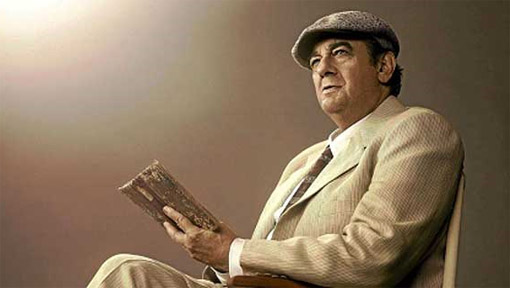“Il Postino” will premiere on PBS at 9 p.m. ET Fri., Nov. 25 as part of the Great Performances series. Based on the 1994 Italian film, it stars tenor Plácido Domingo.
The opera “Il Postino” in its name shows its curious lineage. While not a great opera, “Il Postino” does feature the performance of Plácido Domingo, one of the great opera tenors, in a role specifically written for him during the world premiere performances at the Dorothy Chandler Pavilion in Los Angeles.
The opera is in Spanish, not Italian as its name suggests. “Il Postino” is also the name of the much acclaimed 1994 Italian movie that although originally released in the United States as ‘The Postman’ is now referred to as “Il Postino” to avoid confusion with Kevin Costner‘s 1997 post-apocalyptic movie based on the 1985 David Brin novel.
The movie “Il Postino” was also based on a novel by Chilean writer Antonio Skármeta’s 1983 “Ardiente Paciencia” (Burning Patience) which was later retitled “El Cartero de Neruda” (Neruda’s Postman). The Italian movie “Il Postino” (Skármeta directed a 1983 Spanish language movie of his novel) transferred the location from Chile to Italy, changed the time period and the ending. As you might expect, the movie was in Italian.
The opera “Il Postino” was written by the Mexican composer Daniel Catán. Catán, who died in April of this year, wrote his fourth opera “Il Postino” with his friend Plácido Domingo in mind for the role of Pablo Neruda. Catán had been living in South Pasadena, California, and Domingo, who was born in Madrid, Spain, and grew up in Mexico, is currently the general director for the Los Angeles Opera (since 2003). “Il Postino” made its world premiere as the season opener for the 2010-2011 season of the Los Angeles Opera. By retaining the Italian name, Catán signals to the audience that this opera remains truer to the movie than to the Spanish novel and, as a marketing device, is sure to attract people who loved the Academy-Award winning Italian movie.
The real Pablo Neruda was not only a celebrated poet, he was elected senator as a Communist party member in 1945. When President Gonzalez Vidéla imprisoned striking miners in concentration camps, Neruda spoke out in protest, naming all the miners and their families in his speech “Yo Acuso” (I accuse) in 1947. Neruda eventually fled on horseback with his second wife, Delia del Carril, an Argentine painter, to Argentina. He was in political exile from 1949 and still legally married when he met a Chilean singer Matilde Urrutia. When he journeyed to Capri, it was with Urrutia and not his wife. Urrutia would eventually become Neruda’s third wife.
The novel is set in 1970, when the real Neruda was old and close to death–ill from cancer, living with Matilde at his home Isla Negra, a coastal area in central Chile. Yet it was a time when Neruda was much honored in Chile and internationally. Neruda was nominated to be the presidential candidate for the Communisty Party, but withdrew, giving his support to Salvador Allende who became president. Allende appointed Neruda ambassador to France (1970-1972) and Neruda was awarded the Nobel Prize in 1971. Neruda retired due to ill health, and at the time of his death in 1973, Chilean politics were again in turmoil as General Augusto Pinochet led a military coup that would send the book’s author, Antonio Skármeta, into exile. Skármeta returned to Chile in 1989, after the publication of the novel. With this in mind, the novel’s ending is bitter.
The movie and the opera “Il Postino” are set in the 1950s, as Neruda is beginning his great love affair with Matilde and while not turning away from politics, is beginning to write more about nature and his love for Matilde. Instead of Capri, the movie was filmed in and around the island of Salina, north of Sicily. The basic story is the son of a local fisherman, Mario, becomes the postal carrier for the famous poet Pablo Nerudo while Neruda lives in exile on the island. Through his contact with Neruda, Mario learns how to romance the local beauty, Beatrice, and eventually becomes aware of the natural beauty and political ugliness around him. It’s a romantic fable about fathers and sons, poetry and politics.
Placido Domingo portrays Neruda as a warmer, more fatherly man than Philippe Noiret was in the film. Both Domingo and Noiret are older than Neruda was during his exile. As the naïve mailman Mario, tenor Charles Castronovo, is a more virile presence than the late Massimo Troisi (who was physically weak during the filming and tragically died soon after). Castronovo’s voice is well-matched with Domingo’s.
Yet Catán’s opera isn’t a slavish adaptation of the movie. Some scenes are compressed and there’s a more playful, even risqué atmosphere. Notice the transition from Mario’s first scene with his father to the first scene with Neruda and Matilde. Mario says he will begin work “Mañana.” Then in the following scene Domingo’s Neruda sings the love sonnet XXVII “Mañana” to his Matilde (Cristina Gallardo-Domâs) , “Desnuda eres tan simple como una de tus manos” (Naked, you are as simple as one of your hands). Domingo’s Neruda slowly exposes Gallardo-Domâs’ breasts with her back to the camera. The staging here is a bit awkward, as if either LA Opera director Ron Daniels or PBS presentation’s director Brian Large were hyperaware of the TV filming. Any naughty bits are properly blurred out.
Take It Off, Brünnhilde: On Opera and Nudity
In Catán’s opera, the object of Mario’s affection, Beatrice (Amanda Squitieri), is more earthy and assertively seductive than her movie counterpart. During the Foosball game, Beatrice’s singing is like an aria of sexual congress. It’s her movements and not her cleavage that suggest carnal hunger. Who knew Foosball could be so sexy?
“Il Postino” isn’t an opera with extravagant sets and costumes. The sets are cozy and simple; the costumes aptly conjure up the 1950s (scenery and costumes designed by Riccardo Hernandez). Domingo looks particularly dapper. Catán’s adaptation retains the romantic quality of the Italian movie but with more socio-political content. Of Catán’s music, nothing has that catchy quality that leaves you humming a few bars after watching the opera or guarantees a future in cartoons like Bugs Bunny and Wagner, but the lyricism allows the story and the poetry of Neruda to share center stage with two great tenors. In Spanish with English subtitles.
“Ardiente Paciencia” (Burning Patience)
Jana J. Monji is a Los Angeles freelance writer for the arts who almost always would rather be dancing Argentine tango or East Coast swing than sitting down. She has written for the Los Angeles Times and LA Weekly and currently writes for the Pasadena Weekly and Examiner.com on theater, art, dance. To combat the Los Angeles ailment of road rage, she takes a hammer and torch to metal to make jewelry.















